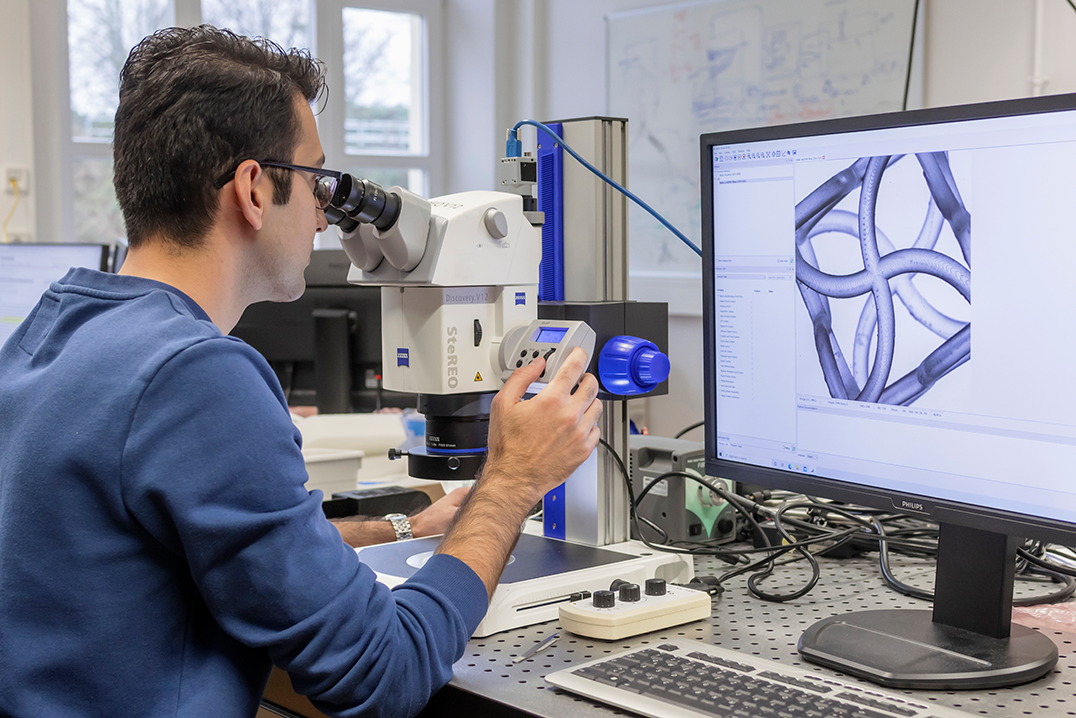News & Press
livMatS establishes policy for research data management
With the help of data management plans, scientists in the cluster will be able to ensure the sustainability of research data

The livMatS research data management policy provides recommendations on how to store, maintain, archive and publish data generated in research projects. Photo: Jürgen Gocke
Data are the backbone of science and thus one of the pillars on which social, economic and technological progress rests. With it come moral, ethical, and practical questions about how researchers handle this data.
With its research data management policy, livMatS helps scientists in the cluster to find answers to these questions. The policy provides recommendations on how to store, maintain, archive and publish data. The cluster's board approved the first policy in September 2022. Data management plans are now available that complete this policy, and all scientists at livMatS will be required to work with these plans as of September 18, 2023.
“For the cluster management, the sustainable handling of research data is of the highest priority,“ says livMatS spokesperson Prof. Dr. Jürgen Rühe. “All scientists who have received and accepted a funding approval for a project within livMatS in 2023 thereby commit at the same time to maintain data management plans.“
livMatS commits to the FAIR principles
“The cluster's primary aim with this is to support researchers in their work,“ says Johannes Hörmann, who developed the policy as livMatS Data Steward together with Principal Investigators of livMatS. “Data management practices according to the FAIR principles benefit individual scientists by making research achievements visible, facilitating collaborations, promoting efficient work, and ensuring the validity of results.“ In addition to personal benefits, these practices also build trust with public stakeholders. “livMatS relies on public funds, to that extent we are committed to conduct research in symbiosis with society and as transparently as possible.“
The FAIR (Findable, Accessible, Interoperable, Reusable) principles aim to ensure that data is easily findable. They ensure that the conditions under which these data can be accessed are identifiable and that they can be integrated with other data. They also stipulate that data are well described so that they can be easily replicated or combined with other data. With its policy, the cluster commits itself to these principles and aims to take an active role in the open science movement, which is also dedicated to the open access of research results.
Data management plans and recommended workflows
In future, scientists will create data management plans for each project within livMatS and continuously update them during the project. For this purpose, the cluster provides templates. Software tools and platforms tailored to the respective discipline can help. The working groups of Prof. Dr. Anna Fischer and Prof. Dr. Ingo Krossing in inorganic chemistry, for example, will establish the electronic lab book “chemotion“. Psychologists workin with Prof. Dr. Andrea Kiesel manage and publish data on the platform “Open Science Framework“, which is considered a standard repository within their community. For this purpose, the researchers have developed a template with Hörmann. “We are already using the template internally to put data management in newly launched projects on a solid basis,“ says Kiesel. Materials scientists led by Prof. Dr. Lars Pastewka use the decentralized “dtool“ to document data distributed in heterogeneous computing systems.
“These are some examples of the transparent handling of research data. On a technical level, there can be no universal solution that is equally suitable for all disciplines,“ says Hörmann. “Living documentation and making research data management processes visible in individual projects are the first important steps toward strengthening such processes and implementing the FAIR principles. For this, we offer tabular templates that can be quickly adapted to one's own project.“
Researchers in the cluster can contact Johannes Hörmann if they are unsure about which procedures and systems are suitable for their project. He will also continue to support the cluster's scientists in implementing the guidelines through workshops, consultations and talks.
The research data managment policy of livMatS: DOI 10.6094/UNIFR/235687
General Information on research data management within the cluster

Johannes Hörmann
livMatS Data Steward
Phone: +49 761 203 95332
Email: data@livmats.uni-freiburg.de
